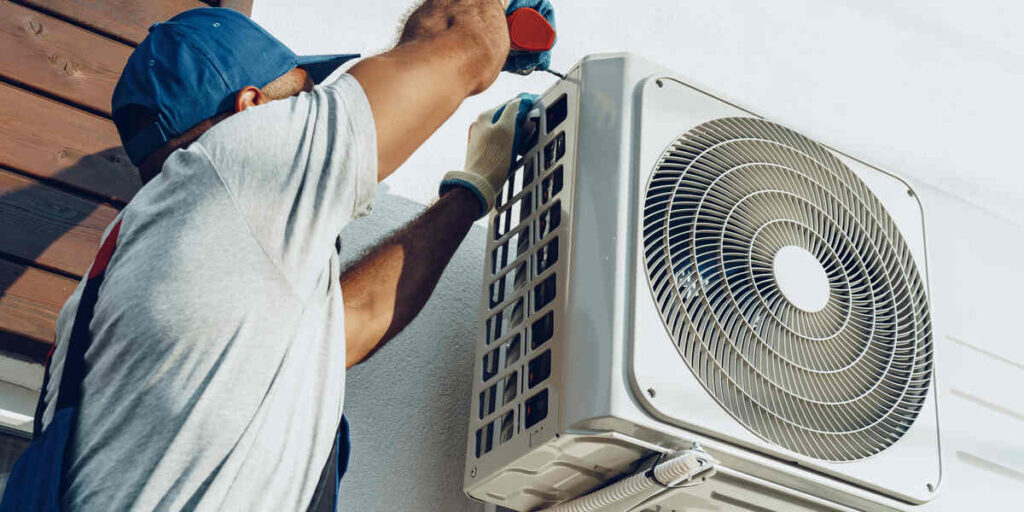When you have problems with your AC, call Topline Heating & Air in Chester (717-628-6825) or Lancaster County (717-482-1667)!
When temperatures heat up, air conditioner short cycling can prevent proper indoor cooling. This process can also waste energy and, more importantly, can also be a sign of an impending AC failure. Any homeowner would wonder, “How do I stop my AC from short cycling?”
Malvern’s expert air conditioner repair company can help you identify and resolve HVAC system issues. We have a few ideas on why your system’s longevity may be at stake and how we can help.
The Problems Short Cycling Can Cause
Before we get into short cycling causes and prevention, you should be aware of why you need to address it. While it may not constitute an immediate emergency in every case, our experts recommend fixing the problem as soon as possible because:
- Short cycling can cause higher electric bills due to the excess energy it uses constantly turning on and off. Just like flickering your lights, it draws in more energy to complete each action.
- As the compressor continues to turn on and off, this process causes wear and tear to the components. This deterioration reduces your system’s longevity, leading to expensive repairs or replacements.
- Although you pay good money for your cooling system, if it doesn’t work, you don’t reap the benefits. You can think of it as flushing money down the drain or letting it fly out the window.
What Can Cause Short Cycling?
Often, short cycling comes from many common air conditioner problems noted by the U.S. Department of Energy. However, when you call an expert and ask, “How do I stop my AC from short cycling?” we check your entire system. We do this because the cause may be more substantial and require detailed repairs or replacements.
#1. Your Unit Is Too Large for Your Home
A unit that is too large for your property will not be able to cool it well. Usually, a full cooling cycle lasts for about 10 minutes before turning off for 10 minutes.
If the unit is too large, the cooling will be too strong for the property. It may cause unevenly cool and warm air in different rooms, with the thermostat registering the air as cold. The system then shuts off, but the cold air doesn’t last long because it wasn’t on long enough. As such, it turns back on, the rooms blast with cold air, and the cycle continues.
#2. Your Air Filter Has Become Too Dirty
Dirty air filters can do more than make you sniffle or cause allergies. The main purpose of an air filter is to prevent dirt, grime, and bacterial buildup in the AC system. A dirty or clogged air filter cannot allow cool air to flow into the property as it should.
The system turns on and off frequently to try to get the temperature as you’d like it. This process increases your energy bills and wears the system down.
#3. Your Evaporator Coils Have Frozen Over
The evaporator coils contain prepared refrigerant to absorb heat energy from your indoor air. However, a few things can prevent the coils from absorbing said heat. For example, the fan to blow air over the loops can malfunction, or in this case, the coils can freeze over.
Frozen evaporator coils prevent heat exchange from the air to the refrigerant. Therefore, your system may blow warm air back into your property.
When the system notices the temperature stagnation from the thermostat, it may shut off and turn back on to fix the issue. Since the coils remain frozen, the AC begins short cycling.
#4. Your AC Is Low on Refrigerant
Refrigerant is a chemical that can change form depending on the amount of pressure it is under. Its different forms allow it to absorb and release heat energy. In an AC, the refrigerant absorbs heat inside the property and releases it outdoors.
However, if your air conditioner doesn’t have enough refrigerant, it cannot absorb enough heat. Moreover, the compressor has a pressure control monitor that shuts off when the coil pressure is too low. If there isn’t enough refrigerant, the pressure control will keep triggering, turning the system off and on.
#5. The Electric System Had Degraded Too Much
We suggest addressing short cycling as soon as possible because the cause can slowly worsen. For example, any of the former issues could lead to system degradation. Eventually, the electric system degradation itself can cause short cycling.
Replacing electrical components can be much more expensive than addressing the former problems. While trouble with the thermostat would be a saving grace, prepare to pay if the issue is internal.
How To Address Short Cycling Issues
“How do I stop my AC from short cycling?” you may wonder. You can do this by addressing the previous issues as much as possible. In some cases, a DIY solution can work:
- You can generally replace the air filter by yourself as long as you know the size and type of filter needed.
- If the problem is related to the thermostat, you can try resetting it or rewiring it if you have some electrical prowess.
- If you notice ice on your evaporator coils, you can try melting it, but that may not address the cause.
However, you cannot address all issues with DIY solutions. For example, refrigerant can be exceptionally hazardous and requires a license to handle and replace. Electrical components can also lead to electrical shock risks for those inexperienced in handling them.
We highly recommend calling an experienced technician that can quickly resolve whatever is causing your HVAC issues.
Topline Heating & Air Offers Expert HVAC Care
At Topline Heating & Air, you can rest assured you will receive top-quality technical assistance. Do you want to know, “How do I stop my AC from short cycling?” or “Can low voltage damage an air conditioner?” We can help with detailed HVAC knowledge and offer fair prices for all work.
Call us at (717) 628-6825 (Chester County) or (717) 482-1667 (Lancaster County, PA) for expert assistance today!When you have problems with your AC, call Topline Heating & Air in Chester (717-628-6825) or Lancaster County (717-482-1667)!
When temperatures heat up, air conditioner short cycling can prevent proper indoor cooling. This process can also waste energy and, more importantly, can also be a sign of an impending AC failure. Any homeowner would wonder, “How do I stop my AC from short cycling?”
Malvern’s expert air conditioner repair company can help you identify and resolve HVAC system issues. We have a few ideas on why your system’s longevity may be at stake and how we can help.
The Problems Short Cycling Can Cause
Before we get into short cycling causes and prevention, you should be aware of why you need to address it. While it may not constitute an immediate emergency in every case, our experts recommend fixing the problem as soon as possible because:
- Short cycling can cause higher electric bills due to the excess energy it uses constantly turning on and off. Just like flickering your lights, it draws in more energy to complete each action.
- As the compressor continues to turn on and off, this process causes wear and tear to the components. This deterioration reduces your system’s longevity, leading to expensive repairs or replacements.
- Although you pay good money for your cooling system, if it doesn’t work, you don’t reap the benefits. You can think of it as flushing money down the drain or letting it fly out the window.
What Can Cause Short Cycling?
Often, short cycling comes from many common air conditioner problems noted by the U.S. Department of Energy. However, when you call an expert and ask, “How do I stop my AC from short cycling?” we check your entire system. We do this because the cause may be more substantial and require detailed repairs or replacements.
#1. Your Unit Is Too Large for Your Home
A unit that is too large for your property will not be able to cool it well. Usually, a full cooling cycle lasts for about 10 minutes before turning off for 10 minutes.
If the unit is too large, the cooling will be too strong for the property. It may cause unevenly cool and warm air in different rooms, with the thermostat registering the air as cold. The system then shuts off, but the cold air doesn’t last long because it wasn’t on long enough. As such, it turns back on, the rooms blast with cold air, and the cycle continues.
#2. Your Air Filter Has Become Too Dirty
Dirty air filters can do more than make you sniffle or cause allergies. The main purpose of an air filter is to prevent dirt, grime, and bacterial buildup in the AC system. A dirty or clogged air filter cannot allow cool air to flow into the property as it should.
The system turns on and off frequently to try to get the temperature as you’d like it. This process increases your energy bills and wears the system down.
#3. Your Evaporator Coils Have Frozen Over
The evaporator coils contain prepared refrigerant to absorb heat energy from your indoor air. However, a few things can prevent the coils from absorbing said heat. For example, the fan to blow air over the loops can malfunction, or in this case, the coils can freeze over.
Frozen evaporator coils prevent heat exchange from the air to the refrigerant. Therefore, your system may blow warm air back into your property.
When the system notices the temperature stagnation from the thermostat, it may shut off and turn back on to fix the issue. Since the coils remain frozen, the AC begins short cycling.
#4. Your AC Is Low on Refrigerant
Refrigerant is a chemical that can change form depending on the amount of pressure it is under. Its different forms allow it to absorb and release heat energy. In an AC, the refrigerant absorbs heat inside the property and releases it outdoors.
However, if your air conditioner doesn’t have enough refrigerant, it cannot absorb enough heat. Moreover, the compressor has a pressure control monitor that shuts off when the coil pressure is too low. If there isn’t enough refrigerant, the pressure control will keep triggering, turning the system off and on.
#5. The Electric System Had Degraded Too Much
We suggest addressing short cycling as soon as possible because the cause can slowly worsen. For example, any of the former issues could lead to system degradation. Eventually, the electric system degradation itself can cause short cycling.
Replacing electrical components can be much more expensive than addressing the former problems. While trouble with the thermostat would be a saving grace, prepare to pay if the issue is internal.
How To Address Short Cycling Issues
“How do I stop my AC from short cycling?” you may wonder. You can do this by addressing the previous issues as much as possible. In some cases, a DIY solution can work:
- You can generally replace the air filter by yourself as long as you know the size and type of filter needed.
- If the problem is related to the thermostat, you can try resetting it or rewiring it if you have some electrical prowess.
- If you notice ice on your evaporator coils, you can try melting it, but that may not address the cause.
However, you cannot address all issues with DIY solutions. For example, refrigerant can be exceptionally hazardous and requires a license to handle and replace. Electrical components can also lead to electrical shock risks for those inexperienced in handling them.
We highly recommend calling an experienced technician that can quickly resolve whatever is causing your HVAC issues.
Topline Heating & Air Offers Expert HVAC Care
At Topline Heating & Air, you can rest assured you will receive top-quality technical assistance. Do you want to know, “How do I stop my AC from short cycling?” or “Can low voltage damage an air conditioner?” We can help with detailed HVAC knowledge and offer fair prices for all work.
Call us at (717) 628-6825 (Chester County) or (717) 482-1667 (Lancaster County, PA) for expert assistance today!



